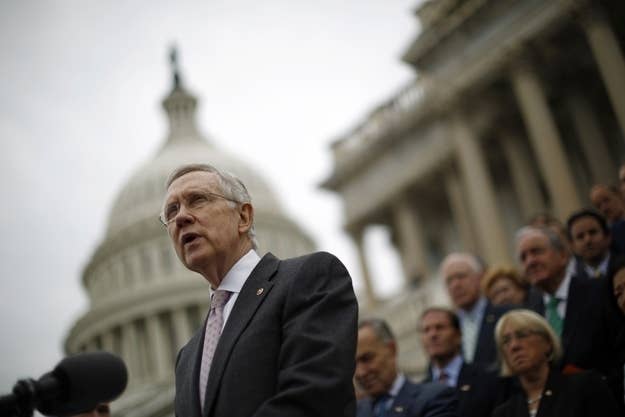
WASHINGTON — The Senate overcame any threat of a filibuster to a bill banning discrimination against LGBT people on Monday, setting up a final vote on the bill in the coming days.
Seven Republicans broke ranks with their party in voting to block any filibusters against the bill, joined by 54 Democrats in the Senate for a 61-30 vote. Democratic Sen. Claire McCaskill, returning from a funeral, did not vote.
The Republicans voting for cloture on the bill were its two Republican sponsors, Sens. Susan Collins and Mark Kirk, along with Sens. Kelly Ayotte, Orrin Hatch, Dean Heller, Rob Portman and Pat Toomey.
The Employment Non-Discrimination Act, which has been pending in Congress over the past 20 years, would, in its current form, ban sexual orientation or gender identity discrimination in most workplaces.
An earlier version of the legislation that only included sexual orientation protections was voted on in 1996, but it failed 49-50. There has been no Senate vote on the legislation since then.
After the vote, Sen. Jeff Merkley — the lead sponsor of the bill in the Senate — described the process by which the last three votes — Ayotte, Portman and Toomey — were secured.
Merkley said that he agreed to back an amendment by Ayotte and Portman that will expand the non-retaliation provision. He also said that the Democratic leadership agreed to allow Toomey to present an amendment expanding the religious exemption, although he added that he had not seen the language of that amendment and therefore could not say whether he would support it.
Earlier Monday, leading supporters of the bill — including Majority Leader Harry Reid and Senate Health, Education, Labor and Pensions Committee Chairman Tom Harkin — spoke about the history of and need for the legislation before the cloture vote.
"It is time, at long last, for us also to prohibit discrimination based on sexual orientation and gender identity," Harkin said.
"No American should be turned away or having to fear loss of their job ... for any reason other than their ability to do their job," he said. Of ENDA, he said. "Now we put this next piece in place."
Later, Kirk took to the floor, giving his first floor speech since he suffered a stroke in January 2012. When Sen. Patrick Leahy addressed the chamber, he referenced former Sens. Ted Kennedy and James Jeffords for their earlier work on the bill.
In addition to any debate in the coming days, the amendments also are expected to be considered before a final vote on the bill, which Democratic aides say is expected Thursday.
Advocates' hopes for Senate passage of the bill, however, were tempered by a preemptive move by House Speaker John Boehner on Monday morning reiterating his opposition to the legislation — a position he has long held.
"The Speaker believes this legislation will increase frivolous litigation and cost American jobs, especially small business jobs," Boehner spokesman Michael Steel stated in an email sent to several reporters Monday.
In addition to questions about litigation resulting from the bill, which have been countered by the General Accounting Office, a key criticism from opponents is that the bill will infringe on religious liberties. Although ENDA contains language providing for a religious exemption, advocates on both sides of the issue — from the Family Research Council to the American Civil Liberties Union — have opposed the exemption, with FRC arguing the provision is too narrow and the ACLU arguing it is too broad. Some, including Sen. Jeff Flake, have also pointed to the transgender protections as being a reason they oppose the legislation.
One LGBT advocate, Mara Keisling of the National Center for Transgender Equality, has suggested that she does not expect House movement of the bill in this Congress, stating that the Senate vote "will change the playing field once we have a friendlier House that can tackle ENDA."
Human Rights Campaign president Chad Griffin, however, appears eager to take on Boehner's opposition, saying in a statement Monday, "The Speaker, of all people, should certainly know what it's like to go to work every day afraid of being fired. Instead of letting the far right trample him again, it's time for Speaker Boehner to stand with the majority of everyday Republican voters and support ENDA."
Griffin isn't alone. Pennsylvania Republican Rep. Charlie Dent is pushing Boehner, too, telling The Washington Post's Greg Sargent, "I believe the Speaker should allow a vote on this bill. I believe that the American public wants to make sure people are not discriminated against, based on race, religion, or sexual orientation."
In the news conference after the vote, Harkin said, "Hopefully the House will be able to get a discharge petition signed," referring to the method of forcing legislation to the floor even if the leadership opposes it by presenting a petition signed by 218 members of the House.
If the House does not advance the bill, by that or any other means, White House press secretary Jay Carney — who has previously said the White House is not considering an executive order to bar federal contractors from discriminating against LGBT workers — appeared to take a more malleable position for the administration on the executive order question.
Asked about ENDA and the executive order, Carney said that "the preferable and better path has been through Congress because that would be inclusive. An executive order that addresses federal contractors obviously would not be inclusive; it would not extend beyond federal contracts."
[Correction: Due to the procedures used in advancing the bill, there is no limit to the debate on the bill itself at this time, although, as noted, it is expected that the bill will advance to a final vote by Thursday. Update: Additional information provided in a news conference after the vote was added to this article.]
